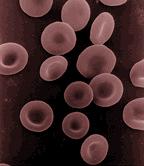Living With Haemophilia
Interview with
Chris - One of the topics covered at the BSGT/ESGCT conference is haemophilia. Meera Senthilingam met an academic with a personal interest in the topic...
Adam - My name is Adam Jones. My profession is I'm a lecturer in physiology for Sunderland University and today, I'm here at the BSGT/ESGCT representing patient views as I have severe haemophilia B. With haemophilia, you have different types of haemophilia and you have different severities. The main ones that people most know about are haemophilia A and haemophilia B. Essentially, it's a disorder of blood clotting. In any haemophilia, one of the proteins in the blood that goes towards the clotting cascade isn't manufactured by the liver. And so, in order to correct that, there's two options - either a liver transplant which isn't a very good option or factor replacement therapy.
 Meera - This is actually what you use, clotting factor 9.
Meera - This is actually what you use, clotting factor 9.
Adam - Clotting factor 9 - that's specific for haemophilia B because it's the 9th one that's missing, Christmas factor. In haemophilia A, it's clotting factor 8.
Meera - And having haemophilia, what exactly happens to you? What are your symptoms?
Adam - I bleed, basically, for longer than most other people. There's a myth that says that haemophiliacs don't stop bleeding. We do stop bleeding eventually, when the blood runs dry (laughter) nah! We do stop bleeding eventually, but it's a prolonged bleeding and it can cause all sorts of worries, all sorts of damage.
Meera - How does this affect your lifestyle? So what do you perhaps have to do differently or what you have to think about, knowing this could happen?
Adam - I can't play contact sports. I have arthritis in my ankles and my elbow because of internal bleeding. It does restrict you in your chosen profession. I can't do anything physical or labouring which is why I went down the academic route. Some other haemophiliacs aren't as lucky as me. There are obvious limitations everywhere. Growing up as a child, I wanted to be in the Royal Navy. I even went to get my interview at the Royal Naval career office, passed all the selection tests, got as far as the medical, and when I told the doctor who was performing the medical that I had severe haemophilia B, he stopped it right there.
Chris - That was Adam Jones, giving a patients perspective on living with haemophilia.









Comments
Add a comment